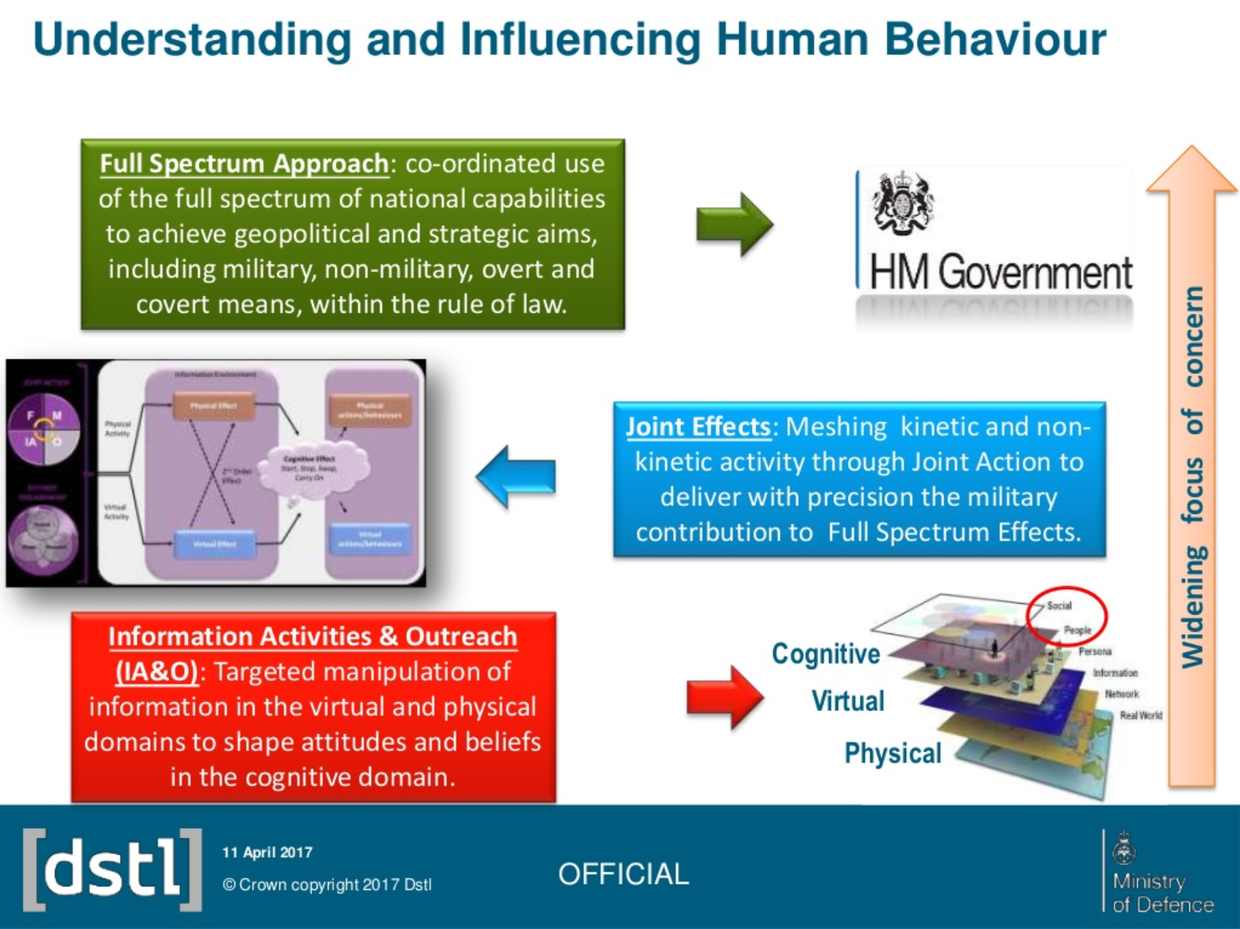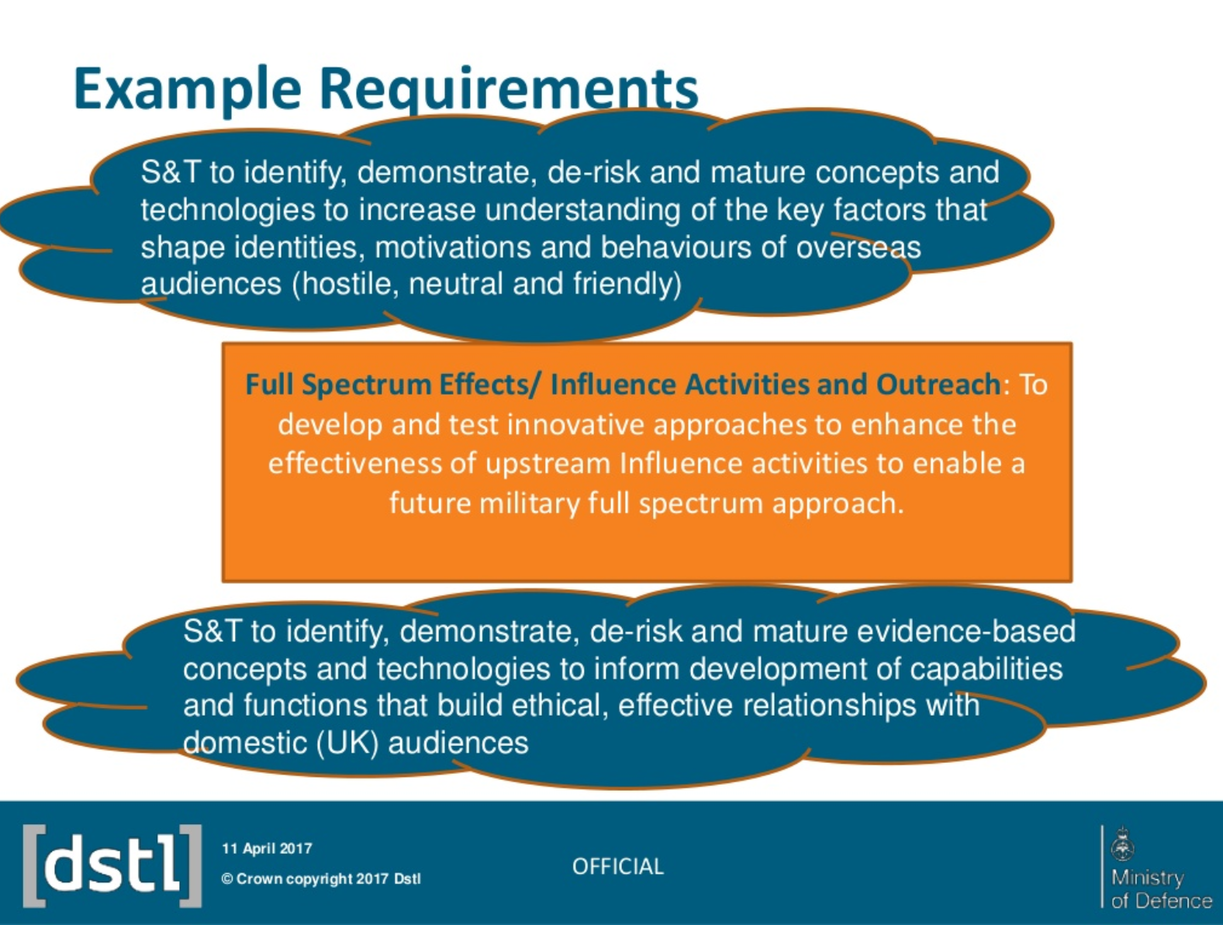‘Influencing human behavior’: UK MoD-funded psychological research project leaked

The UK Defense Ministry is actively looking for a contractor for its new psychological research, which is allegedly aimed at boosting troops’ performance and well-being. Some details of the project are quite unnerving, though.
The ministry’s agency known as the Defense Science and Technology Laboratory (DSTL) has been seeking contributions from specialists in the fields of psychiatry, neuroscience and social sciences that would help the military shape its future strategies and policies. The University of Cambridge was particularly shortlisted by the DSTL among the four organizations it said were eligible for taking part in an almost £70 million ($92.4 million) research program known as the Human and Social Sciences Research Capability (HSSRC).
Also on rt.com Huge Psy-op in UK? Not interested. British media silent on Integrity Initiative months onAt first glance, the whole study appears to be mostly aimed at supporting the troops and improving their performance in the rapidly changing environment of the “21th century in the UK and globally.” Five out of six research areas listed in the Cambridge tender bid that gives a detailed insight into what appears to be the nature of the project are dealing with typical personnel issues pretty much every country’s military could face nowadays.
The list includes providing “novel approaches… to support delivery of a sufficient, capable, motivated and cost-efficient workforce,” helping the military to develop necessary skills, optimizing personnel performance and improving the troops’ psychological and physical health.
Boosting army’s image?
The sixth area, however look far less innocent as it is called “understanding and influencing human behavior” and requires any future Defense Ministry partners to develop “information activities and outreach…as non-kinetic components of military full spectrum effects” as well as to enable “messaging of the UK domestic and Defense internal audiences that promotes attraction … of our people (military and civilian).”
‘Ignorant’ Muslims must be taught to ‘appreciate’ NATO - new batch of Integrity Initiative leakhttps://t.co/qsrMtG0GTx
— RT (@RT_com) 26 января 2019 г.
Although it could be simply regarded as another effort to boost the military’s image among its own ranks, as well as among the domestic population, it still looks like an attempted con on the public.
The whole situation starts to look even grimmer as the layout of the project also says from the very onset that it would provide funding to mitigate some “reputational risks” for Cambridge stemming from its participation in the MoD-funded research as well as to promote “the positive impact of the university’s involvement.” After all, one would not even speak about such risks if there were none.
Academic backlash
The bid was first leaked in mid-February while the project itself was made public as early as 2017 when it was presented by the DSTL. However, the issue was initially picked up only by the Cambridge student newspaper, Varsity, and has attracted some broader media attention only now.
Meanwhile, the reaction of the academic community to the Cambridge bid was surprisingly negative, particularly if one takes the claim that the project is primarily aimed at supporting the British troops at face value.
Also on rt.com Coups are Peace, Censorship is Trust, Intolerance is Love: 3 Orwellian slogans Western leaders adoreEven though the university’s participation in the project was initially approved both by the General Board and the Committee on Benefactions, External and Legal Affairs (CBELA), which scrutinizes funding for ethical and reputational risks, it was still met with skepticism and resentment among some academics and students.
“The University should not be involved in secretive military [...] programs, especially not without proper democratic consultation of staff and students,” one academic told Varsity back in February.
Contracts of this sort restrict academic freedom by imposing projects and ideological parameters, and most often include confidentiality clauses on the results.
Later, more than 40 academics expressed their “deep concern” over the issue. On Wednesday, Simon Schaffer, a professor of the history and philosophy of science at Cambridge, also criticized the project as he spoke to the Guardian.
#Google admits it forgot to tell users about its hidden spy microphone....Google be like: 'Ooops!'https://t.co/JJtZHj4SMY#NestSecurepic.twitter.com/8v9ZEGrhAX
— RT (@RT_com) 21 февраля 2019 г.
“It’s very striking that a programmer designed to change people’s views and opinions for military purposes would spend some of its money changing people’s views and opinions, so that they wouldn’t object to changing people’s views and opinions,” he said, apparently referring to the project’s plan to spend some money on promoting the positive side of the research.
See what they did there? Propaganda squared, and that seems wrong.
In February, a university spokesperson said that Cambridge had dropped out of the tender but was conspicuously tight-lipped about the details, such as why and when this decision was taken.
Targeted manipulation
However, it appears that the project might have much more far-reaching and much more controversial goals than just boosting the UK military’s image at home with a little bit of good old propaganda. A 2017 project presentationpublished on the UK government website shows that the “influencing human behavior” section of the project also involves something that could be considered psychological warfare.

The research should help London achieve its “geopolitical and strategic aims” through the use of “full spectrum of national capabilities,” including “covert means.” It is also allegedly aimed at developing techniques of “targeted manipulation of information in the virtual and physical domains to shape attitudes and beliefs in the cognitive domain.”
A DSTL spokesperson further told the Guardian on Wednesday that the research into “targeted manipulation of information” was focused on “communicating with overseas audiences and deterring adversaries who threaten the UK’s interests.”

These statements sound particularly disturbing in the light of recent revelations about the Integrity Initiative – another UK-funded psyop outfit. Masquerading as a “completely independent” charity project aiming to highlight “disinformation” online, this government-funded project has been running “influence” operations all around Europe and interfering in the domestic politics of other countries, conspiring with fossil fuel-friendly banks to target anti-fracking activists and smearing the opposition leader Jeremy Corbyn as a Kremlin asset.
Integrity Initiative’s anti-Russia crusaders spread ‘the very definition of propaganda’https://t.co/IBndrKvN5Epic.twitter.com/C8oTlTiWwZ
— RT (@RT_com) 12 января 2019 г.
Although, the nature of the new UK MoD project is still not exactly clear, the idea that the UK military might harness some psychological influence technologies supported by extensive scientific research and use them as part of the information warfare both inside and outside the UK might be truly unnerving.
Think your friends would be interested? Share this story!














